Where the Creativity of Business Meets Art
Third Interview: Innovation x Creativity (Part 2)
27 July 2023
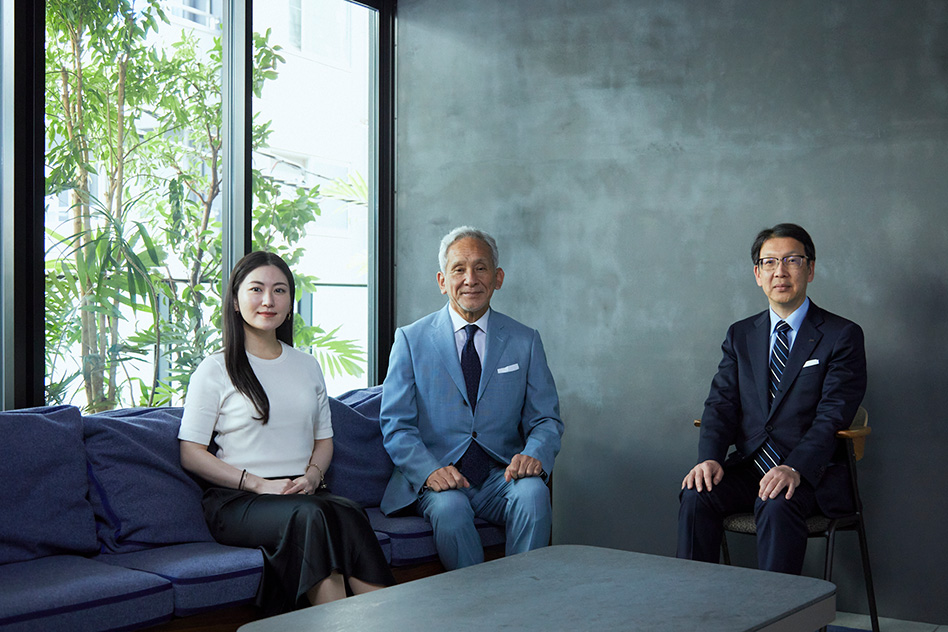
All human beings become innovators the moment they're born. You should take a stab at doing something interesting, even if you end up failing despite your best efforts. The lessons you learn will often outweigh the failures, and you’ll be free to move on to another challenge. Keep doing this, and good things will come your way. That's what it means to be an innovator. (Yonekura)
Okuda: Dr. Yonekura, you’ve discovered and mentored numerous innovators. What is it that you see in them?
Yonekura: Innovators defy categorization. I believe that all human beings become innovators the moment they’re born. We all get put in the usual boxes through the education process, but some parts of us can’t be categorized. Anyone who can develop those unusual parts of themselves can become an innovator. The most important thing is a desire for what you want to do. When e-Education’s Kaito Miwa and founder Atsuyoshi Saisho went to Bangladesh, they found that education was scarce and that there was a lack of teachers, which gave them the idea to introduce the video education system used at Japanese prep schools. They had a strong feeling that something had to be done about the situation. I was intrigued by their proposal of using video education—which is used throughout Japan for exam education—in a place like Bangladesh, where there weren’t enough teachers. On top of that, they really seemed to be enjoying themselves. The principle I always convey to younger people is, one, “Is it interesting?” And two, "Is it worth pursuing or not?” There’s nothing worse than doing something tedious and then failing to succeed. You should take a stab at doing something interesting, even if you end up failing despite your best efforts. The lessons you learn will often outweigh the failures, and you’ll be free to move on to another challenge. Keep doing this, and good things will come your way. That's what it means to be an innovator. It's different from taking a path that is tried and true.
Okuda: So you’re saying that all human beings are born innovators? That begs the question, where should we direct this innate potential to innovate? Some people in the corporate world believe that only those with audacious ideas or those who make significant technological advances are innovators. However, turning ideas and technologies into viable businesses requires a variety of innovators, big and small, across different fields. As a close-to-home example, even if someone comes up with the idea of burning ammonia in thermal power generation to reduce CO2 emissions and the technology is developed, transforming it into a business requires altering legal regulations and devising ways to secure investment. I consider these all to be aspects of innovation. Innovation is a collective effort of innovators on different scales. When they work together, innovation turns into business and gradually takes root in society. So there's no hierarchy in value between innovators, big or small. The critical factor is whether individuals with such mindsets can be properly recognized, adequately compensated, and encouraged to forge ahead as a team.
My personal creed is, “Only crazy people can change the world.” Large corporations still have plenty of potential if they are able to create unconventional teams made up of a diverse range of professionals. (Yonekura)
Yonekura: Japan needs more “T-shaped” professionals who can collaborate across disciplines. “I-shaped” professionals who are experts in one area will tell you to leave the organization and finances to them or that they are the best at employee welfare. Large corporations that have amassed immense management talent like this can't afford not to utilize it. Particularly in Japan, where there are limited outlets for venture business, a company must leverage its talent to have a fighting chance of success. From what I gather, JERA does possess incredible management talent, so much so that it seems impossible for small companies to compete. But even small companies can emerge victorious. It’s those people—the truly crazy ones—who do whatever it takes to win. And this is the scary part—why can't large companies move quickly despite possessing incredible management talent? If you’re an exceptional employee, you’ll diligently complete the tasks assigned to you and listen to the voices of your customers, yet only do what falls within your purview. My personal creed is, “Only crazy people can change the world.” Without those crazy enough to do something unprecedented—the ones eager to venture into uncharted territories and who pull all-nighters for something they love—amassing exceptional employees alone won't suffice. People say this kind of talent doesn't exist in large corporations, but I assure you, it does. The art of 21st-century management involves finding those individuals, urging them to climb the ladder, and once they're on the second floor, removing it and lighting a fire under them. If you can harness the power of the unconventional, you can succeed.

Okuda: I mostly agree. It's a mistake to foster a culture that suppresses these “crazy” individuals, yet it's equally problematic to let them run rampant. But I don’t think “crazy” alone is enough to do business. So unless we position smaller innovators within the organization and create a system that allows for innovation, these “crazy” individuals will never get to the point where their ideas can work on a business level. That's a significant weakness.
Yonekura: The reason why this isn't happening at large corporations in Japan today—and why it is happening in places like Silicon Valley—is because the professionals there are building an ecosystem. When there's an exciting idea, people gather around it and transform it into a business. Facebook was initially built to learn the names of the girls in the dorm. It was built around making that possible. The social network business got started when a professional said, “Hey, this is interesting,” and slapped a billion-dollar price tag on an immature idea, transforming it into a business model. Money is attached to these “crazy” ideas, and in order to turn them into businesses, professional managers and lawyers support them as part of an ecosystem.
But consider this. Even large corporations, albeit on a smaller scale, possess this type of ecosystem internally. Therefore, it's crucial to have the courage and speed to turn “crazy” ideas within the company into business opportunities in one fell swoop. The thinking is that a small percentage of internal funds should be viewed as an investment of time and money in the future. What makes Silicon Valley powerful, in my opinion, is that the people bringing these “crazy” ideas there are coming from all over the world. From places like India, Israel, and of course, Japan. This means that large Japanese corporations, too, need to ensure that at least about 30% of their employees are individuals with diverse backgrounds or unconventional careers. This includes women, the LGBT community, foreign nationals, older adults, and people with disabilities.
When psychological safety is ensured, even the craziest people can feel safe coming up with unconventional ideas. It's also important to maintain a positive attitude. (Yonekura)
Tanaka: There are plenty of individuals with unconventional ideas out there. I also think it's important to foster an environment where people can feel safe about expressing their “craziness.”
Yonekura: Yes, that’s very important. Google has demonstrated a statistical advantage where good ideas stem from workplaces where psychological safety is assured and high performance is attained. I also heard from Coach Iwade, who led Teikyo University's rugby team to ten national championships, that there had been a clear shift since Generation Z, necessitating a new approach to management. When I asked if rugby could still be governed by sheer willpower, he responded with a definitive “no,” stating that he would immediately resign if that were the case. He said that an organization where older students treat younger students like servants is unacceptable, emphasizing the importance of a system where senior students instead serve the first-year students, much like stewards. Hearing this significant shift in sports, it dawned on me that companies and schools are undergoing similar transformations. If you come down hard on young people, they'll just quit and choose from the large pool of other opportunities.
Tanaka: I think one of the differences with the West is that in Japan, we choose either to use or not to use honorific language with our coworkers. The barrier created by honorifics is palpable. I think it's easier to casually share your thoughts and bounce ideas off of each other when you speak plainly without polite language.
Yonekura: It might be somewhat subliminal. What is emerging now is the concept of psychological safety. It’s about creating a safe space where people can say and do anything without fear of abandonment or banishment from the team. A place where you can feel safe to fail is where trust is built, and success is found. Let me give you an example. A study on well-being showed that people who consider themselves happy are 1.3 times more productive and 4 times more creative. Japan is trailing behind Italy in that regard. I've recently realized that people need to smile more. Looking around at the people working in Japanese companies, you see a lot of somber faces. We should all aim to smile more, to work in an atmosphere of happiness and safety. But we mustn't let comfort breed complacency. We need to intentionally cultivate a cycle that encourages discovering the “crazy” and unconventional, taking on challenges, and even failing.
I only approach people who I think will be open to hearing what I have to say, and I try to convey my passion for whatever it is I am doing. The people who are willing to work with me are usually the ones who understand me on an emotional level. (Tanaka)
Okuda: Frankly, Ayako, I see you blazing a trail in your own “crazy” way. Yet, you've managed to build a network of people who believe in and support you. You're a soprano singer, and you're also a successful business owner. How do you manage to draw people into your orbit?
Tanaka: I only approach people who I think will be receptive to what I have to say. I don't try to pitch myself to someone who I feel won't understand me, no matter how passionately I try to present my case. When starting a new project, for example, I'm not accustomed to incorporating other elements into my work, so I just focus on trying to convey my passion for whatever it is I am doing. And even if I try to take an emotional angle in my pitch, I'm not particularly adept at conveying the technical details. The people who choose to work with me are the ones who can relate to me on an emotional level.

I think passion is the common thread that unites innovators. If you have a strong passion, it draws like-minded people in, and an ecosystem can be built from there. (Okuda)
Okuda: That's interesting. I think you’ve hit the nail on the head. At the end of the day, it all comes down to passion, doesn't it? I think passion is the common thread that unites innovators. If you have a strong passion, it draws like-minded people in, and an ecosystem can be built from there. From that perspective, the management materials shared at board meetings might seem a bit boring. [laughs] After all, they aren’t really used to convey your passion or your feelings. They mainly revolve around explanatory materials for investors, such as the internal rate of return (IRR) percentage, potential risks, and so on. Of course, a company must ultimately provide these explanations, and while they are important, I don't think that's where we should start. We first need a burning desire to accomplish something, and we should convey just how interesting and beneficial it would be for us to achieve it. Only then should we need to persuade financial institutions and investors, talking about the numbers and explaining how to overcome any potential hurdles. That's the way it should be. If we don't foster a company culture that ignites passionate conversations about such aspirations, it will be hard for the innovators hidden among us to truly shine.
Without a strong desire, new initiatives stagnate, and innovation can’t take place. I think passion is what’s missing from the boardroom. (Yonekura)
Yonekura: It's imperative to create an atmosphere where people feel they can speak their minds. If Mr. Okuda suggests not starting with facts and figures, then that's what you should do. It's untenable to say failure is okay, only to penalize someone if they do end up failing. The companies that truly set themselves apart are the ones that, even when a failure occurs, share what they’ve learned and discuss what should be done next. Without a strong desire, new initiatives stagnate, and innovation can’t take place. I think it’s fair to say that passion is what’s missing from the boardroom.
Okuda: Companies, almost instinctively, focus on improving their financial statements to enhance management performance. But as much as refining financial statements is important, they can also be interpreted from another perspective: they reflect the company's equity capital, which signifies the amount of risk they are able to absorb. That is why equity capital exists, after all. If you have a certain amount of equity capital, it’s critical that you choose to assume a proportionate amount of risk. If that can’t be done, I don't see it as proper management.
Okuda: Companies, almost instinctively, focus on improving their financial statements to enhance management performance. But as much as refining financial statements is important, they can also be interpreted from another perspective: they reflect the company's equity capital, which signifies the amount of risk they are able to absorb. That is why equity capital exists, after all. If you have a certain amount of equity capital, it’s critical that you choose to assume a proportionate amount of risk. If that can’t be done, I don't see it as proper management. Yonekura: That's exactly it. When you look at the statistics for Japanese companies, you'll see that the dividend payout ratios have been high since around 1995, and stock prices have remained relatively stable, yet there hasn’t been an increase in employee salaries. So why have some companies been able to sustain themselves? Because they don't invest in R&D or IT. They hoard money and distribute dividends on the strength of their existing technology base. That's how they manage to maintain a fairly decent stock price. But what companies really need to do is innovate by developing new technologies, try new things, pay fair wages, and pay their taxes. Lately, there seems to be an increasing number of situations where things are completely backward.
Okuda: There are organizations called rating agencies, based on an American business model, that evaluate a company's performance and determine its investment grade. Since the establishment of systems like this, companies have primarily focused on enhancing their performance. This is because the moment they are deemed unfit for investment, they face the risk of severe cash flow problems. This means that improving a company's performance and being a good company are two fundamentally different things. But the worth of a company can’t be measured by its financial condition alone—evaluating a company is as complex as evaluating art. If we were to liken financial statements to music, they would merely be sheet music. The real value is determined by how the piece is performed. Yet, I feel that Japanese companies have unfortunately surrendered to an alien culture where everything is defined by the sheet music alone.
Yonekura: Indeed, it is a lot like music. However, even in the US, there's been a recent shift toward emphasizing the importance of non-financial information. In the US, for example, business management education focuses on the realities of real-world businesses, so it continually generates a wealth of ideas. The trend is to consider non-financial information in investment decisions, meaning factors like the proportion of women and minorities among employees and whether the company is positively impacting the environment and society—all factors that don't necessarily show up in the numbers. However, Japanese companies are susceptible to external pressure and are more likely to remain compliant. They have held steadfast to their traditional ROE-focused management style, and they've been able to maintain their stock prices by hoarding retained earnings and paying dividends rather than investing in their employees and R&D. But by not investing in the future, they've stopped growing. And the world is shifting toward management styles that emphasize ESG—Environmental, Social, and Corporate Governance—which includes non-financial information. This is the point where, ideally, Japanese companies should seize the moment and say, “Our time has finally come.”
Tanaka: All of this talk of aiming for better performance. It’s a lot like being in a contest, isn't it?
Okuda: Yes, and that can get dull. Sure, everyone is good at what they do, but that doesn't necessarily make things interesting.
Tanaka: Because the goal is to win, right? The way we play to score well in a contest might not always resonate with the audience. It's fascinating how this holds true in the business world as well.
Yonekura: It's great that the worlds of music and business can learn from each other, isn't it?
JERA’s Zero CO2 Emissions 2050 is an example of true innovation. I appreciate that JERA is focusing on a broader range of people. The issue of decarbonization can't be solved by people in developed countries alone. (Yonekura)
Yonekura: When I heard about JERA's transitional approach toward decarbonization, I was struck by how you were focused on a broader range of people. The issue of decarbonization can't be solved by people in developed countries alone. If we were to suggest to people in Africa that they could decarbonize using only solar and wind energy, they'd end up deprived of everyday electricity. Japan's approach of providing solutions to bridge this gap is commendable. I hope you continue championing this message because it is, after all, built on the premise that no one should be left behind.
Okuda: I’m thrilled to hear that you see JERA's Zero CO2 Emissions 2050 as an innovation.
Yonekura: It is an innovation. I think it's really interesting. I also find artists equally engaging. Just the other day, I was watching the International Chopin Piano Competition on TV, where contestants were able to choose from a variety of different pianos. It struck me as a battle to figure out which piano would best express their performance and which would best complement the piece they’d chosen to perform. To survive that kind of situation, the artist needs to deliver a performance that is all-encompassing. I'm not an expert by any means, but I found it quite intriguing to see a variety of individuals coming onto the scene, including a pianist named Kyohei Sorita, who is also involved in business.
There’s a growing number of strategic musicians in the classical music world. We are seeing more conductor-like soloists who are able to manifest their unique presence and individual style without disrupting the overall performance. (Tanaka)
Tanaka: There’s a growing number of strategic musicians in the classical music world, and the generation following mine, in particular, is full of individuals who truly embody the entrepreneurial spirit. In Europe, there's been a surge in the number of people who are not only launching their own labels but are also creating their own promotional videos and controlling their image. Traditionally, musicians were focused on performing the sheet music without disrupting the overall performance—very much in line with the Japanese way of thinking, where teamwork is everything. But we are seeing more conductor-like soloists who are able to manifest their unique presence and individual style without disrupting the overall performance—who are still able to see the big picture.
Yonekura: I quite like that phrase, the “conductor-like soloist.” On the flip side, perhaps there's a diminishing number of these strategic individuals working in business, while conversely, people in more creative fields are becoming increasingly strategic. It would certainly be concerning if those in business weren't able to inject a bit more creativity into their work.
I approach the works of Mozart and Beethoven as if I'm reading a letter written by an uncle who lives next door. It would be lovely if my personal interpretation could allow the voices of Mozart and Beethoven to come through. (Tanaka)
Yonekura: Ayako, how do you train and keep your body in shape for singing?
Tanaka: Well, a singer shouldn’t be too thin, and having too much muscle isn’t good either. But the body is like an instrument, and people with high voices like mine tend to be on the slender side. I have to maintain a certain level of fitness because if I put on too much weight, I lose the lightness in my voice. But being too thin can make me feel weak, so it's a delicate balance to strike. I believe that the body and the soul are connected, and I think that a person with an energetic soul will also have a good physique. When you look at business people walking around, don't a lot of them look like zombies? Their souls are tired. And if the soul is tired, the mind doesn’t work.
If I had read your book Creative Response: Entrepreneurial History of Modern Japan when I was in junior high or high school, my life might have taken a different turn.
Yonekura: People ask me, “How are you able to make history so interesting?” But for me, history is really just fiction disguised as non-fiction. For instance, no one today has ever seen Ryoma Sakamoto, yet we all have some kind of picture of him in our minds. I believe this is largely due to the influence of Ryotaro Shiba’s novel, Ryoma Goes His Way (竜馬がゆく, Ryoma ga Yuku), where Shiba was able to skillfully convey his message by adopting the persona of Ryoma Sakamoto. Similarly, my history books are really just a reflection of my own sentiments. [laughs]
Tanaka: When I approach the works of an artist like Mozart or Beethoven, I’m always careful not to view them as the work of some great genius. Instead, I try to approach them as if I'm reading a letter written by an uncle living next door. I’ve had the pleasure of reading your books, Dr. Yonekura, and I found them incredibly accessible. I resonated with them instantly. But I always felt detached from the historical figures we studied in school, which made it difficult for me to relate to them on a personal level.
Okuda: That probably ties into your artistic sensibility. I sense very little embellishment in your singing. As a classical music enthusiast, I can say that most Western musicians tend to sing in a way that says, "This is quintessential Beethoven," or, "This is pure Mozart." In your case, Ayako, your unique interpretations seem to flow naturally and intuitively into the listener's ear. I think this somehow connects with what we're discussing now.
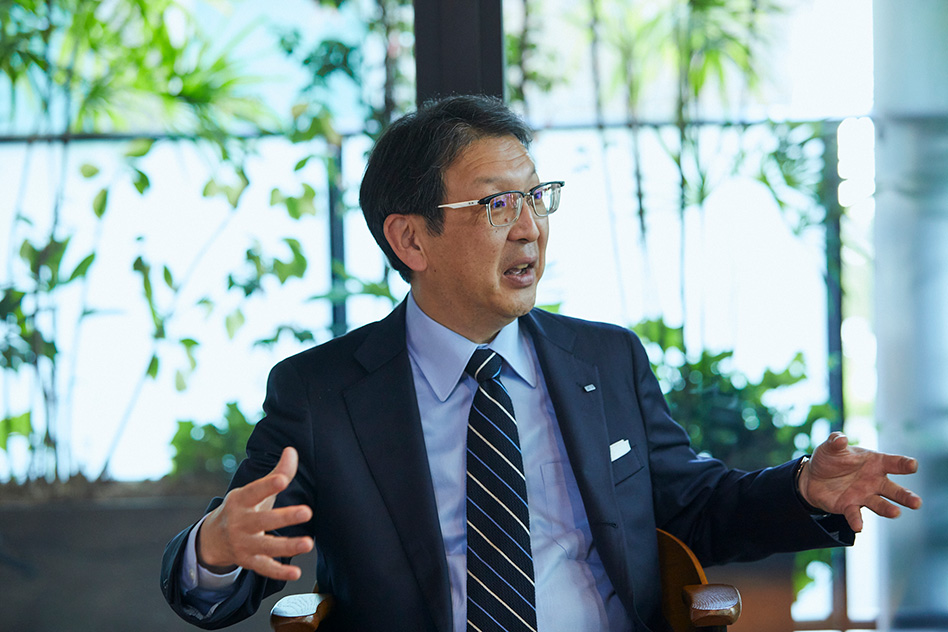
Tanaka: I live in Europe, and whenever I encounter a difficult person, I try to remind myself that it is an opportunity to be more tolerant in my everyday interactions with other people. Instead of assuming some malicious intent, I'd rather give them the benefit of the doubt and think that they don't mean any real harm. It makes me wonder if we all need to slow down and live more simply. The older we get, the more we get wrapped up in our titles, don't we? But I actually don't believe people change all that much from when they’re kids to when they’re in their 70s or 80s. Thinking that way causes my perspective to shift quite dramatically. It's far more enjoyable to strip away the armor of titles and observe the true essence of the person that lies underneath.
Yonekura: Viewing Beethoven as some man who lives down the street—that's a great way of looking at it. Really very interesting. That reminds me of when I met the Dalai Lama, and I found myself thinking, "He's just like the old guy from the corner shop." [laughs]
Okuda: You know, not many musicians would say that kind of thing. Others will conduct extensive research and go on about the historical context in which a piece of music was composed. But everything a composer wants to express should be there within the sheet music, right? All you should have to do is be straightforward in your reading of the score. That would naturally result in music that is uniquely yours. Art emerges from the interplay between the performer and the sheet music, so there may not be a need to delve too deeply into the life and times of a composer or pontificate on what they may have been feeling when they wrote a specific piece.
Yonekura: Before the WBC finals, Shohei Ohtani said about the American team, “Let’s stop admiring them.” They were facing Team USA, which from a Japanese perspective, is an A-list team full of all-stars. But Ohtani urged his fellow players to see them as opponents, not as heroes to be looked up to. It's the same principle. It's much more enjoyable to think of Mozart and Beethoven as friendly guys who live down the street instead of knights in shining armor.
Tanaka: I look at a piece of sheet music as if it were a letter, not a work of art. In that sense, calling something “innovative” could feel like a suit of armor that is too heavy, leading me to think, “I couldn’t possibly be innovative.”
Yonekura: I see, so for you, Ayako, reading a piece of Mozart sheet music is like reading a letter from him. That's a fascinating perspective. This idea of innovation being a suit of armor is not good, though we're all guilty of perpetuating it, myself included. Recently, I've been emphasizing the fact that innovation isn't the ultimate goal. If there's no need for it, there's no need to strive to be innovative as an individual or as a company. It would be much better to be a fun and pleasant organization. It's the intent that matters—whether it's wanting to create a company where everyone enjoys working or wanting to drive the economy while preserving the environment. It's through this process that various insights emerge, which are later labeled as being “innovative.” That's what innovation really is. I don't think any company that starts out saying, “Let's innovate,” can ever truly be innovative.
Tanaka: Precisely. Applying this to music—wouldn't it be wonderful if we could take a letter or song written by someone down the street, interpret it in our own way, and have the result sound like Mozart?
The strong are those who possess both “imagination” and “creativity.” (Yonekura)
Yonekura: Ayako, you offer an endless stream of insights. I love the idea of having a letter “sound like Mozart.” The strong are those who possess both “imagination” and “creativity.” In our schools today, we aim to foster these talents, equipping students with both qualities and encouraging them to contemplate tackling societal challenges with the power of innovation, what we call social innovation. I believe that if we can accomplish this, people will appreciate Japan's contribution to the world. But if we continue down our current path, we may find ourselves labeled as a nation that can never fully realize its potential.
Tanaka: It’s all about the fusion of art and business. As we converse, it feels like we're experiencing the “Medici Effect,” and I believe some fascinating ideas are being generated. But it makes me wonder—what should we be doing in education to foster imagination? I had never given much thought to how nurturing imagination from an early age could foster future creativity, but after reading Creative Response: Entrepreneurial History of Modern Japan, I've come to realize how important it really is. If we can't imagine something, we can't accept it, nor can we create anything new. It might be the most important thing after life itself, and I find myself wondering why it hasn't been given more importance until now.
Yonekura: People often say how important creativity is and that we should be doing more music and visual arts, but imagination is important on an even more fundamental level. It's about conjuring up a world that doesn't exist or a future that you've never seen before.
Okuda: I mentioned how all innovators have passion, but if you were to ask where that passion comes from, I think you’d hear that it originates from a variety of different feelings that only come with the accumulation of experiences. Without them, becoming an innovator is near impossible.
Yonekura: Recognizing what resonates with you, listening to what stirs your emotions, and engaging in the limitless potential of the imagination—those are the things that really matter, aren't they?
Okuda: We never run out of things to talk about, do we? Thank you for your time.
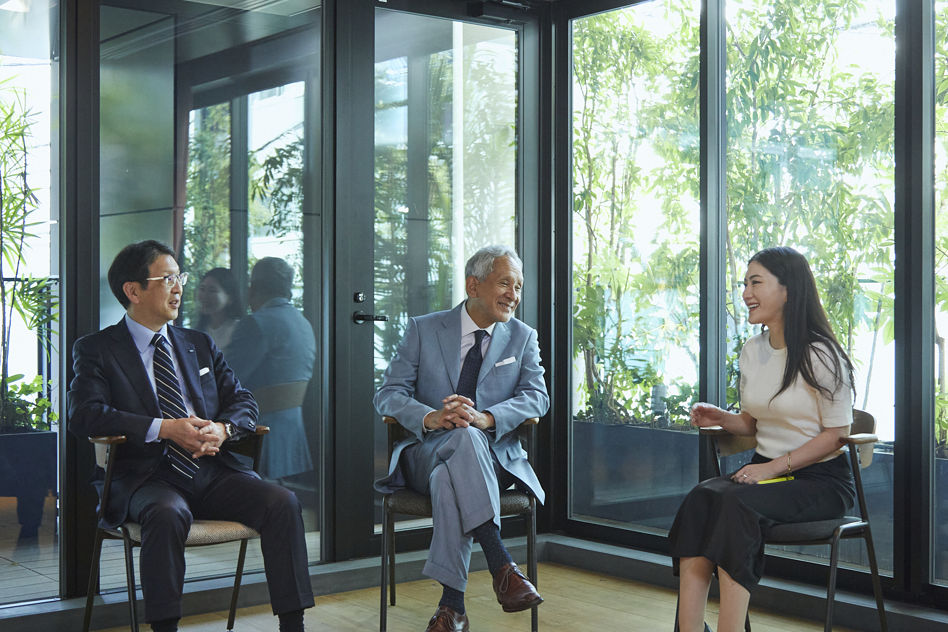
(End of Interview)
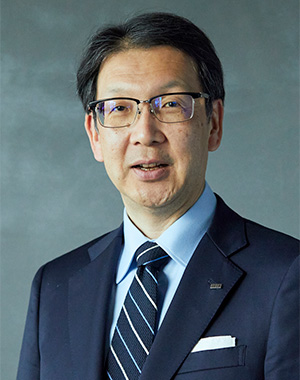
“Large corporations still have plenty of potential if they are able to create unconventional teams made up of a diverse range of professionals.” This statement from Dr. Yonekura felt like a powerful message and a rallying cry. The notion that it’s important to ensure safe spaces for the “crazy” people in your company to feel safe sharing their ideas is, I believe, the definitive crossroad in determining whether or not a large company can transition to a value-creating entity.
At the end of our conversation, our guests both brought up “imagination” and “creativity.” These two concepts are likely the wellspring of the kind of unconventional thinking that can reshape society, and I'm eager to use subsequent conversations to explore how we can cultivate those qualities.
It was also a tremendous honor to hear Dr. Yonekura say that he considers JERA’s global perspective to be the strength of our decarbonization strategy. How can we ensure that everyone around the world, regardless of country, can gain sufficient access to clean energy at an affordable price? Our answer to this question, the result of our relentless pursuit, is JERA Zero CO2 Emissions 2050. (Closing statement by Okuda)
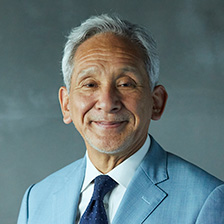
Professor Emeritus, Hitotsubashi University Professor, Hosei University Graduate School
Seiichiro Yonekura
Born in 1953. Specializes in business history. B.A. in Sociology and Economics, Hitotsubashi University; M.A. in Sociology, Hitotsubashi University.
D. in History from Harvard University (PhD.). D. in History from Harvard University. Currently, he also serves as President of Creative Response Social Innovation School and Chairman of the Editorial Board of Hitotsubashi Business Review.
He specializes in historical research on corporate management strategies, development processes, and organizations with innovation at the core, and is enthusiastically supported by numerous business leaders. He is the author of numerous books, including Creative Response: Entrepreneurial History of Modern Japan (Toyo Keizai Shinposha).
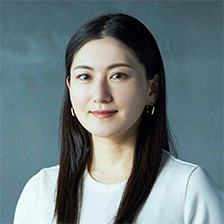
Ayako Tanaka
Soprano singer
CEO, Japan Association for Music Education Program
At the age of 18, Tanaka traveled to Vienna alone to study. At 22, she made her debut at the Stadttheater Bern in Switzerland, becoming the youngest soloist ever in the theater and the first Japanese person to perform there. Since then, she has performed in Vienna, London, Paris, Buenos Aires, and many other cities worldwide. Her premiere concert of „Five Circle Songs for Coloratura Soprano and Orchestra“ composed for her voice by Esteban Benzecry, was chosen the Best World Premiere Piece by the Argentine Music Critic Association. The album received five stars from the BBC Music Magazine, the world's best-selling classical music magazine.
Tanaka is also engaged in giving back to society through activities such as the SCL International Youth Music Festival held in Vienna with the support of UNESCO and the Austrian government to assist young performers, as well as the National Youth Orchestra of Argentina, which was established with the support of the Argentine government to provide education to young people of various backgrounds and family situations through music.
Tanaka was named one of Newsweek's "100 Most Respected Japanese in the World" in 2019. She sang the Japanese national anthem on October 22 at the opening ceremony of the SMBC Nippon Series 2022.
Born in Kyoto, Tanaka lives and works in Vienna.
RELATED STORIES
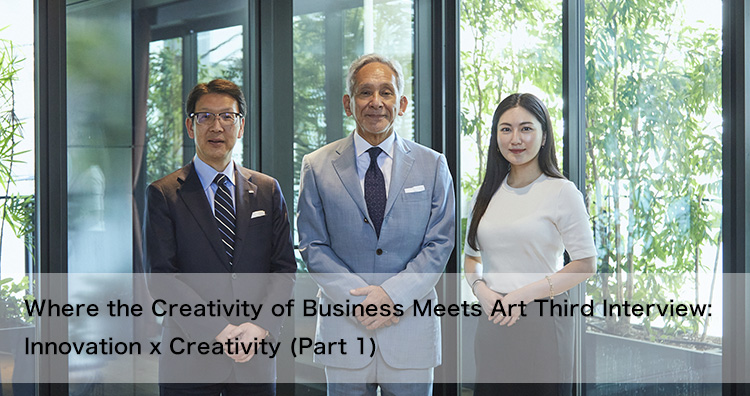
Where the Creativity of Business Meets Art Third Interview: Innovation x Creativity (Part 1)
Today, we welcome a special guest, Dr. Seiichiro Yonekura, one of Japan's leading experts in innovation research.

Where the Creativity of Business Meets Art Second Interview: Education x Creativity (Part 1)
Today marks the first time we’re doing a three-person interview. We are joined by Mr. Kaito Miwa, CEO and co-founder of …

Where the Creativity of Business Meets Art Second Interview: Education x Creativity (Part 2)
Recently, I've developed a new presentation style, where I seek to connect with the audience by openly sharing my weaknesses

